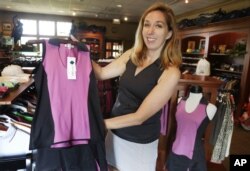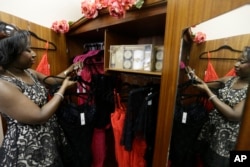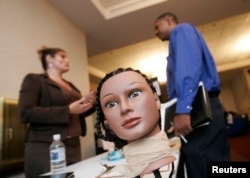The United States has its first major female presidential nominee of a major party. Does that mean the “glass ceiling,” restricting opportunities for women, is gone?
No, America’s small-business owners said in a survey conducted by Bank of America. Seventy-seven percent of the women and 56 percent of the men surveyed said they thought the glass ceiling existed for some women and minorities. Also, 51 percent of female entrepreneurs surveyed said they started their own business because they wanted to be their own boss.
Aquila Leon-Soon, chief executive officer of Advanced Talent Solutions, a New York company that assists nonprofits and government in recruitment and staffing, told VOA that the glass ceiling is real.
Leon-Soon said “some people feel like there’s no glass ceiling for an entrepreneur, but that’s not true, especially when you’re a woman entrepreneur. And I think for some people, when they hear how successful a company is, they’re surprised [when] a woman is at the helm.”
That shows that as a nation, "we have a lot more that we need to do to change the way people view entrepreneurs and how successful women can be,” she said.
The B of A survey found that 54 percent of female small-business owners did not feel affected by the glass ceiling, but 46 percent admitted they had felt limited by it at some point in their careers.
More optimism
Sharon Miller, head of small business at Bank of America, said the survey “reveals that now more women small-business owners, rather than men, are optimistic about their annual revenue increasing and more women than men plan to grow their business over the next five years.”
The research findings, Miller said, were based on feedback from 1,001 small-business owners across the country, including an over-sample of female business owners. According to Miller, “from 2015 to 2016, the number of men small-business owners expressing optimism about revenue and growth declined significantly, more than 15 percentage points."
The survey said that “while both women and men small-business owners share similar views on top economic concerns over the next 12 months, more women small-business owners are concerned about corporate tax rates, strength of the U.S. dollar and commodities prices. Women are also more likely to support raising the minimum wage than men. Fifty-five percent of women entrepreneurs say a boost in the minimum wage would have a positive effect on the economy, compared to only 41 percent of men."
What about loans?
A major part of getting a business started is finding the necessary capital. Bank of America’s Miller said her bank and others are there to help.
"We bank all types of people across the country, including entrepreneurs who may not be a citizen, but with the legal documents, such as a green card, to provide the appropriate information required," she said. "There are opportunities for people to grow, start businesses and expand businesses.”
Miller said it is true that some have to fund through business credit cards and traditional loans, or perhaps special funding programs the bank can suggest. The survey showed that more than one in four women still feel they do not have the same access to capital as their male counterparts.
Leon-Soon initially experienced that crucial problem of access to capital.
“The first time I went to the bank to take out a loan to cover payroll,” she said, “I was turned down. And this was a major bank. I was told [it was] a bank friendly to startup organizations. The reason I was turned down was that we didn’t have enough time in our business. But I had multiple degrees, I went to Columbia University’s business school, I had industry experience, so I knew how to start a business. But they didn’t take that experience into account.”
She added, “They just thought I was only in business for a few months. I did have receivables. So being turned down for a loan, I still had to cover payroll.”
Leon-Soon took loans out from her 401(k) retirement savings plan. She also borrowed from family and friends and used credit cards. Later, with continued contracts and a good bottom line at her company, she had no trouble gaining access to funds.
Major keys to success
Capital is crucial, but Leon-Soon said "hiring the right talent is right up there" in terms of importance. "It is crucial to surviving as an entrepreneur.” Having mentors who can show you the ropes of being an entrepreneur, knowing how to make effective pitches for business to prospective clients and having materials that look professional are other keys to making the business work.
But what is success? To Miller and B of A, success is helping entrepreneurs get their businesses going by providing the resources and ultimately having a new and successful client.
For Leon-Soon, it’s making enough money to cover expenses, making an impact, influencing people’s lives, and delivering solutions to clients to make their businesses better.
The survey indicated that more women than men, 60 percent versus 52 percent, planned to expand their businesses over the next five years.
And small businesses are the backbone of American commerce. According to the Small Business Administration, small businesses — companies with fewer than 500 employees — make up more than 99 percent of U.S. firms.















